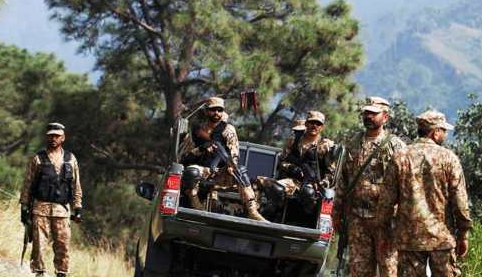Contents
A fresh surge in militant activity across Khyber Pakhtunkhwa and Balochistan has claimed the lives of 11 individuals, including eight members of the security forces and three civilians. The series of incidents point to a disturbing escalation in targeted violence in the country’s volatile western belt.
IED Blast Targets Security Convoy in Mastung
In Balochistan’s Mastung district, a roadside bomb struck a convoy of security personnel in the Kirdgab area on Tuesday evening. The device, planted and detonated remotely, hit a vehicle near Killi Pasand Khan.
According to the military’s media wing, ISPR, three troops, including a senior officer, lost their lives in the attack, which officials attributed to militants associated with the banned Baloch Liberation Army (BLA). Three others were injured and moved to Combined Military Hospital, Quetta.
FC Troops Fall in Karak Ambush
A vehicle belonging to the Frontier Constabulary came under fire in the Amankot area of Karak district. Militants—believed to be affiliated with the Tehreek-i-Taliban Pakistan (TTP)—opened fire from a nearby hilltop as the truck passed through the region.
Four lives were lost in the assault: three FC personnel and their civilian driver. The group had been deployed to secure a nearby oil and gas installation. Rescue teams reached the site quickly and transported the deceased to a local medical facility in Terri.
Off-Duty Soldier Fatally Attacked in Lakki Marwat
In a separate incident, a Frontier Corps soldier was shot while on leave in the Railway Station area of Lakki Marwat. The victim, who had recently returned to his hometown of Zangikhel, was attacked near his residence.
His body was transferred to the Government City Hospital for legal formalities. Law enforcement launched a search operation in the area shortly after the shooting. The soldier was later laid to rest with full state honours.
Police Inspector, Two Civilians Lose Lives in Peshawar Shooting
A late-night shooting in Peshawar’s Michni Gate area led to the loss of three lives, including Police Inspector Ali Hussain. He was travelling with friends when unknown assailants riding motorcycles opened fire on their vehicle.
City police recovered over 60 spent bullet casings from the scene. SSP Operations Masood Bangash said the attackers fled towards the outskirts of the city. Inspector Hussain was serving as the head of the investigation cell at the Michni Gate police station.
DC Convoy Comes Under Fire in South Waziristan
An attempted attack on a convoy carrying South Waziristan’s Deputy Commissioner Asmatullah Wazir and Additional Deputy Commissioner Zahid Younis was reported in the Habib Kot area of Ladha tehsil.
Gunmen opened fire on the vehicles, damaging windows and slightly injuring two police escorts due to shattered glass. The officials reached safety, and security forces have launched a probe to track down those responsible.
In another disturbing incident, a Pakistan Navy commando was wounded after being targeted near Bachkan Ahmadzai while travelling home on a motorcycle. The 22-year-old serviceman, posted in Karachi, was on leave when two men on a bike attempted to intercept him.
In his initial statement to police, the commando said one of the attackers aimed a pistol at him before opening fire when he resisted. The injured serviceman managed to survive and later filed a formal complaint. A case has been registered, and investigations are ongoing.
Broader Implications
These back-to-back incidents—spanning Mastung, Karak, Lakki Marwat, South Waziristan, and Peshawar—highlight the evolving threat landscape in Pakistan’s western regions. Security experts believe that while the frequency of attacks fluctuates, their tactical nature suggests a renewed coordination among banned outfits.
Despite years of counterterrorism efforts, the ability of militants to stage such diverse attacks within a short window raises pressing questions about intelligence sharing and border security.
Authorities have reiterated their commitment to pursuing those behind the violence, with security heightened across sensitive zones in the wake of the attacks.


